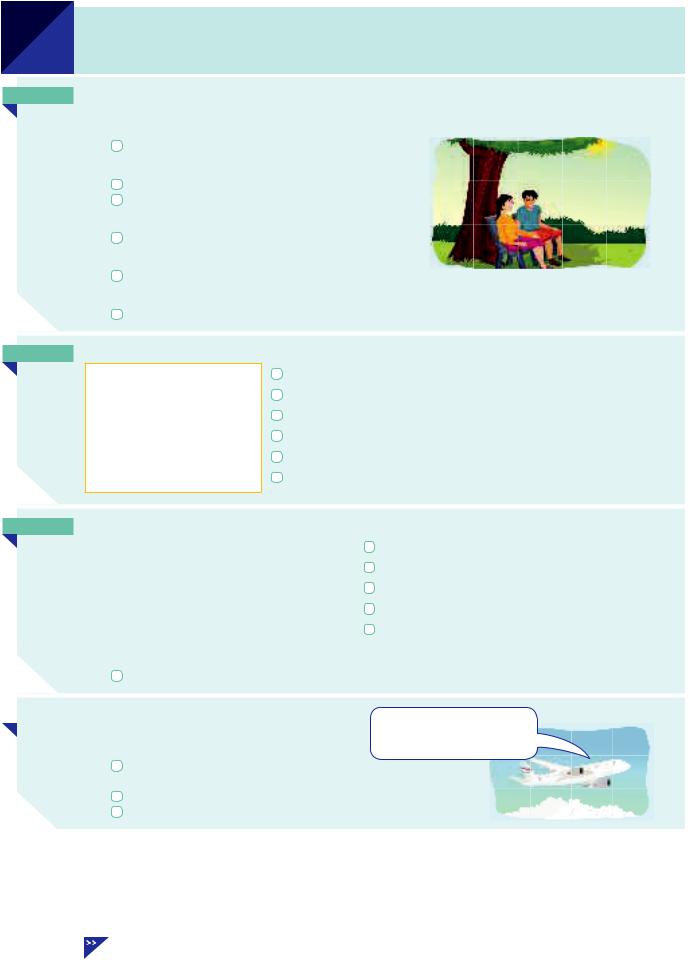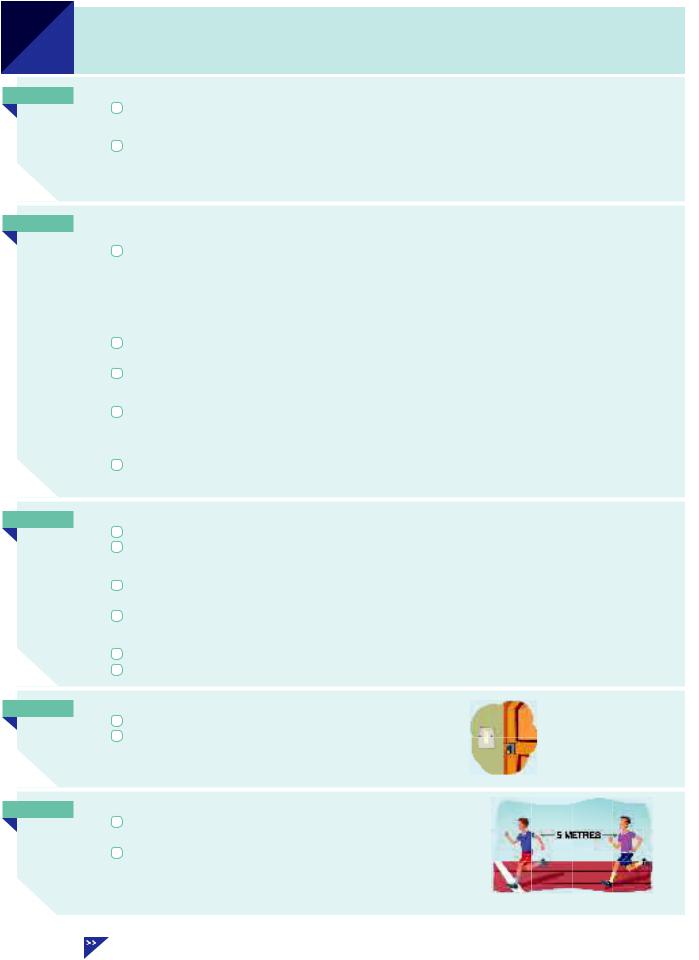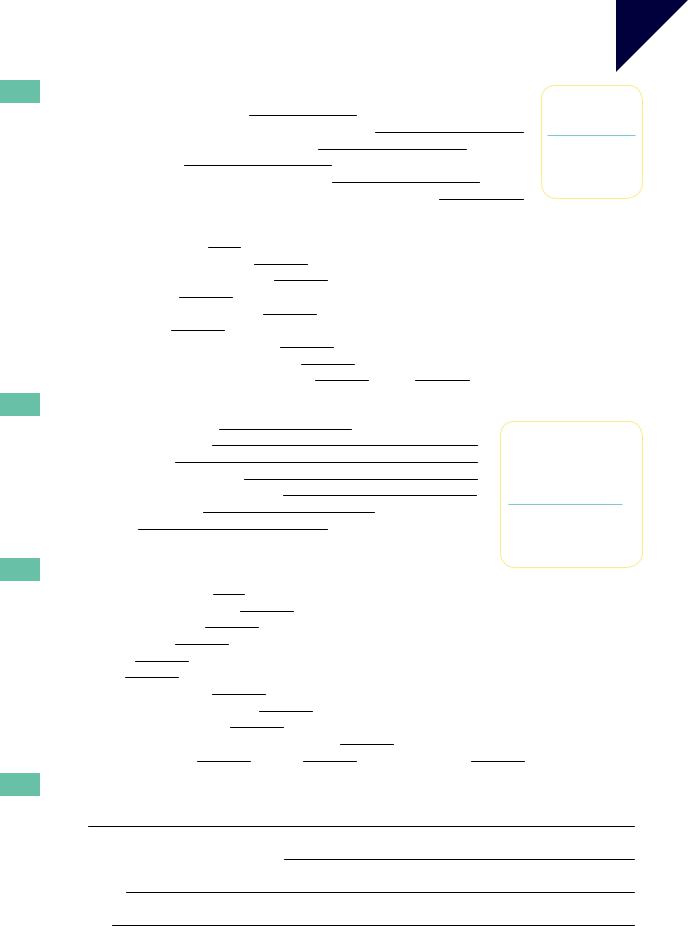
- •Contents
- •Thanks
- •To the student
- •To the teacher
- •3 Present continuous and present simple 1 (I am doing and I do)
- •10 Present perfect continuous and simple (I have been doing and I have done)
- •11 how long have you (been) … ?
- •12 for and since when … ? and how long … ?
- •13 Present perfect and past 1 (I have done and I did)
- •14 Present perfect and past 2 (I have done and I did)
- •15 Past perfect (I had done)
- •16 Past perfect continuous (I had been doing)
- •17 have and have got
- •18 used to (do)
- •19 Present tenses (I am doing / I do) for the future
- •20 I’m going to (do)
- •21 will and shall 1
- •22 will and shall 2
- •23 I will and I’m going to
- •24 will be doing and will have done
- •26 can, could and (be) able to
- •27 could (do) and could have (done)
- •28 must and can’t
- •29 may and might 1
- •30 may and might 2
- •31 have to and must
- •32 must mustn’t needn’t
- •33 should 1
- •34 should 2
- •35 I’d better … it’s time …
- •36 would
- •39 if I knew … I wish I knew …
- •40 if I had known … I wish I had known …
- •41 wish
- •42 Passive 1 (is done / was done)
- •43 Passive 2 (be done / been done / being done)
- •44 Passive 3
- •45 it is said that … he is said to … he is supposed to …
- •46 have something done
- •47 Reported speech 1 (he said that …)
- •48 Reported speech 2
- •49 Questions 1
- •52 Question tags (do you? isn’t it? etc.)
- •53 Verb + -ing (enjoy doing / stop doing etc.)
- •54 Verb + to … (decide to … / forget to … etc.)
- •55 Verb (+ object) + to … (I want you to …)
- •56 Verb + -ing or to … 1 (remember, regret etc.)
- •57 Verb + -ing or to … 2 (try, need, help)
- •58 Verb + -ing or to … 3 (like / would like etc.)
- •59 prefer and would rather
- •60 Preposition (in/for/about etc.) + -ing
- •61 be/get used to … (I’m used to …)
- •63 there’s no point in -ing, it’s worth -ing etc.
- •64 to … , for … and so that …
- •65 Adjective + to …
- •66 to … (afraid to do) and preposition + -ing (afraid of -ing)
- •67 see somebody do and see somebody doing
- •68 -ing clauses (He hurt his knee playing football.)
- •69 Countable and uncountable 1
- •70 Countable and uncountable 2
- •71 Countable nouns with a/an and some
- •74 the 2 (school / the school etc.)
- •75 the 3 (children / the children)
- •77 Names with and without the 1
- •78 Names with and without the 2
- •79 Singular and plural
- •80 Noun + noun (a bus driver / a headache)
- •81 -’s (your sister’s name) and of … (the name of the book)
- •82 myself/yourself/themselves etc.
- •83 a friend of mine my own house on my own / by myself
- •84 there … and it …
- •85 some and any
- •87 much, many, little, few, a lot, plenty
- •90 all every whole
- •91 each and every
- •92 Relative clauses 1: clauses with who/that/which
- •94 Relative clauses 3: whose/whom/where
- •95 Relative clauses 4: extra information clauses (1)
- •96 Relative clauses 5: extra information clauses (2)
- •97 -ing and -ed clauses (the woman talking to Tom, the boy injured in the accident)
- •98 Adjectives ending in -ing and -ed (boring/bored etc.)
- •99 Adjectives: a nice new house, you look tired
- •100 Adjectives and adverbs 1 (quick/quickly)
- •102 so and such
- •104 quite, pretty, rather and fairly
- •105 Comparative 1 (cheaper, more expensive etc.)
- •106 Comparative 2 (much better / any better etc.)
- •107 Comparative 3 (as … as / than)
- •108 Superlative (the longest / the most enjoyable etc.)
- •109 Word order 1: verb + object; place and time
- •110 Word order 2: adverbs with the verb
- •111 still any more yet already
- •112 even
- •114 in case
- •116 as (as I walked … / as I was … etc.)
- •117 like and as
- •119 during for while
- •121 at/on/in (time)
- •122 on time and in time at the end and in the end
- •123 in/at/on (position) 1
- •124 in/at/on (position) 2
- •125 in/at/on (position) 3
- •126 to, at, in and into
- •127 in/on/at (other uses)
- •129 Noun + preposition (reason for, cause of etc.)
- •130 Adjective + preposition 1
- •131 Adjective + preposition 2
- •132 Verb + preposition 1 to and at
- •134 Verb + preposition 3 about and of
- •135 Verb + preposition 4 of/for/from/on
- •136 Verb + preposition 5 in/into/with/to/on
- •137 Phrasal verbs 1 Introduction
- •138 Phrasal verbs 2 in/out
- •139 Phrasal verbs 3 out
- •142 Phrasal verbs 6 up/down
- •143 Phrasal verbs 7 up (1)
- •144 Phrasal verbs 8 up (2)
- •145 Phrasal verbs 9 away/back
- •Additional exercises
- •Study guide
- •Key to Exercises
- •Key to Additional exercises (see page 302)
- •Key to Study guide
- •Index

Unit
127 in/on/at (other uses)
Ain
in the rain / in the sun / in the shade / in the dark / in bad weather etc.  We sat in the shade. It was too hot to sit in the sun.
We sat in the shade. It was too hot to sit in the sun.
Don’t go out in the rain. Wait until it stops.
in a language / in a currency etc.
How do you say ‘thank you’ in Russian? How much is a hundred pounds in dollars?
(be/fall) in love (with somebody)
They’re very happy together. They’re in love. |
|
in a (good/bad) mood |
|
You seem to be in a bad mood. What’s the matter? |
in the shade |
|
|
in (my) opinion |
|
In my opinion the movie wasn’t very good. |
|
Bon
on TV / on television on the radio
on the phone on fire
on purpose (= intentionally) on the whole (= in general)
I didn’t see the news on TV.
I heard the weather forecast on the radio.
I’ve never met her, but I’ve spoken to her on the phone.
Look! That car is on fire.
I’m sorry. I didn’t mean to hurt you. I didn’t do it on purpose.
Sometimes I have problems at work, but on the whole I enjoy my job.
Con holiday / on a trip etc.
|
|
(be/go) on holiday / on vacation |
I’m going on holiday next week. |
|
|
|
(be/go) on a trip / on a tour / on a cruise etc. |
One day I’d like to go on a world tour. |
|
|
|
(be/go to a place) on business |
Emma’s away on business at the moment. |
|
|
|
(be/go) on strike |
There are no trains today. The drivers are on strike. |
|
|
|
(be/go) on a diet |
I’ve put on weight. I’ll have to go on a diet. |
|
|
|
|
|
|
|
|
We also say ‘go somewhere for a holiday’: |
|
|
|
|
Steve has gone to France for a holiday. |
|
|
|
|
|||
D |
at the age of … etc. |
We are now flying at a speed of |
||
|
|
at the age of 16 / at 90 miles an hour / |
800 kilometres an hour and at an |
|
|
|
at 100 degrees etc. : |
altitude of 9,000 metres. |
|
|
|
Tracy let |
school at 16. or |
|
|
|
Tracy let |
school at the age of 16. |
|
The train was travelling at 120 miles an hour.
Water boils at 100 degrees Celsius.
254 |
in/at/on (time) Unit 121 in/at/on (position) Units 123–125 |

Exercises |
Unit |
127 |
|
|
|
127.1 Complete the sentences using in + the following:
the mood |
cold weather |
love |
my opinion |
French |
the rain |
kilometres |
the shade |
1 Don’t go out |
in the rain |
. Wait until it stops. |
|
2 |
Matt likes to keep warm, so he doesn’t go out much |
. |
||
3 |
The movie was |
|
with English subtitles. |
|
4 |
They fell |
almost immediately and were married in a few weeks. |
||
5 |
I don’t feel like going to a party tonight. I’m not |
|
. |
|
6 |
It’s too hot here. I’m going to sit |
|
|
under that tree. |
7 |
Amanda thought the restaurant was OK, but |
|
it wasn’t very good. |
|
8 |
Fity miles? What’s that |
|
|
? |
127.2 Complete the sentences using on + the following:
|
|
business |
a cruise |
a diet |
fire |
holiday |
her phone |
|
|
|
the radio |
|
purpose |
strike |
TV |
a tour |
the whole |
1 |
I heard the weather forecast |
on the radio |
. It’s going to get warmer. |
|||||
2 |
Workers at the company have gone |
|
|
for better pay and conditions. |
||||
3 |
Don’t go |
|
|
if you don’t like being at sea. |
||||
4 |
There was panic when people realised that the building was |
. |
||||||
5 |
Soon ater we arrived, we were taken |
|
of the city. |
|||||
6 |
Emma has lots of useful apps |
|
. |
|
||||
7 |
I feel lazy this evening. Is there anything worth watching |
? |
||||||
8 |
I’m sorry. It was an accident. I didn’t do it |
|
. |
|||||
9 |
If you are |
|
|
, there are certain things you’re not allowed to eat. |
||||
10 |
We’ll be |
|
|
from Friday. We’re going to the mountains. |
||||
11 |
Jane’s job involves a lot of travelling. She oten has to go away |
. |
||||||
12 |
Some of the exam questions were hard, but |
|
it was OK. |
|||||
|
|
|
||||||
127.3 |
Complete the sentences with in, on or at. |
|
|
|||||
1 |
Water boils |
at 100 degrees Celsius. |
|
|
||||
2 |
When I was 14, I went |
a trip to France organised by my school. |
||||||
3 |
Julia’s grandmother died recently |
the age of 90. |
|
|||||
4 |
Can you turn the light on, please? I don’t want to sit |
the dark. |
||||||
5 |
We didn’t go |
holiday last year. We stayed at home. |
|
|||||
6 |
I hate driving |
fog. You can’t see anything. |
|
|||||
7 |
Technology has developed |
|
great speed. |
|
||||
8 |
David got married |
19, which is rather young to get married. |
||||||
9 |
I listened to an interesting programme |
the radio this morning. |
||||||
10 |
I wouldn’t like to go |
a cruise. I think I’d get bored. |
|
|||||
11 |
The earth travels round the sun |
107,000 kilometres an hour. |
||||||
12 |
I shouldn’t eat too much. I’m supposed to be |
a diet. |
|
|||||
13 |
A lot of houses were damaged |
the storm last week. |
|
|||||
14 |
I won’t be here next week. I’ll be |
holiday. |
|
|||||
15 |
I wouldn’t like his job. He spends most of his time talking |
the phone. |
||||||
16 |
‘Did you enjoy your holiday?’ |
‘Not every minute, but |
the whole, yes.’ |
|||||
17 |
|
your opinion, what should I do? |
|
|
||||
18 |
Ben is a happy sort of person. He always seems to be |
a good mood. |
||||||
19 |
I don’t think violent films should be shown |
TV. |
|
|||||
20 |
The museum guidebook is available |
several languages. |
||||||
Additional exercise 34 (page 322) |
255 |

Unit
128 by
AYou can say that something happens by mistake / by accident / by chance:
We hadn’t arranged to meet. We met by chance.
But we say ‘do something on purpose’ (= you mean to do it):
I didn’t do it on purpose. It was an accident.
Note that we say by chance, by accident etc. (not by the chance / by an accident). In these expressions we use by + noun without the or a.
BWe use by … to say how somebody travels. For example, you can travel:
by car |
by train by plane by boat by ship by bus by bike etc. |
|||
Jess usually goes to work by bus / by bike / by car. |
|
|||
We do not use by if we say my car / the train / a taxi etc. We say: |
||||
by car |
but |
in my car (not by my car) |
|
|
by train |
but |
on the train |
(not by the train) |
|
We use in for cars and taxis: |
|
|
||
They didn’t come in their car. They came in a taxi. |
|
|||
We use on for bikes and public transport (buses, trains etc.): |
|
|||
We travelled on the 6.45 train, which arrived at 8.30. |
|
|||
Note that we usually say on foot (not usually by foot): |
|
|||
Did you come here by car or on foot? |
|
|||
We also use by to say how we do other things. For example, you can: |
||||
send something by post |
pay by card / by cheque |
do something by hand |
||
Can I pay by credit card?
But note that we say pay cash or pay in cash (not usually by cash).
CWe say that ‘something is done by …’ (passive):
Have you ever been bitten by a dog?
The programme was watched by millions of people.
Compare by and with:
The door must have been opened with a key. (not by a key) (= somebody used a key to open it)
The door must have been opened by somebody with a key.
We say: a play by Shakespeare, a painting by Rembrandt, a novel by Tolstoy etc.
Have you read any poems by Shakespeare?
‘Who is this painting by? Picasso?’ ‘I have no idea.’
DBy also means ‘next to / beside’:
The light switch is by the door.
Come and sit by me. (= next to me)
LIGHT SWITCH 
EYou can also use by… to show the dif erence between two things:
Clare’s salary has increased by ten per cent. (= it’s now ten per cent more than before) Carl won the race by five metres.
(= he was five metres in front of the other runners)
CARL
256 |
Passive + by Unit 42B by + -ing Unit 60B by myself Unit 83C by (time) Unit 120 |

Exercises |
Unit |
128 |
|
|
|
128.1 Complete the sentences. Choose from the box.
1 |
We don’t need cash. We can pay |
by credit card . |
|
|
by mistake |
|||
|
|
by hand |
||||||
2 |
Kate and James keep in touch with one another mainly |
|
. |
|||||
|
by credit card |
|||||||
3 |
I didn’t intend to take your umbrella. I took it |
|
. |
|
||||
|
|
by chance |
||||||
4 |
I think he arrived late |
|
|
. He wanted to keep us waiting. |
|
|||
|
|
|
by email |
|||||
5 |
Some things are planned. Other things happen |
|
. |
|
||||
|
|
on purpose |
||||||
6 |
Don’t put my sweater in the washing machine. It has to be washed |
|
. |
|||||
|
|
|||||||
|
|
|
|
|
|
|
||
128.2 |
Put in by, in or on. |
|
|
|
|
|
|
|
1 |
Jess usually goes to work |
by bus. |
|
|
|
|
||
2 |
I saw Jane this morning. She was |
the bus. |
|
|
|
|||
3 |
How did you get here? Did you come |
train? |
|
|
|
|||
4 |
I couldn’t find a seat |
the train. It was full. |
|
|
|
|||
5 |
How much will it cost to the airport |
taxi? |
|
|
|
|||
6 |
Did you come here |
Sarah’s car or yours? |
|
|
|
|||
7 |
The injured man was taken to hospital |
ambulance. |
|
|
|
|||
8 |
How long does it take to cross the Atlantic |
ship? |
|
|
|
|||
9 |
He doesn’t drive much. He goes everywhere |
bike or |
foot. |
|
|
|||
128.3 Complete these sentences about books, paintings etc. Choose from the box.
1 |
I was woken up in the night by a strange noise . |
by mosquitoes |
|||
2 |
These pictures were taken |
. |
|||
by one of our players |
|||||
3 |
I hate getting bitten |
. |
|||
by lightning |
|||||
4 |
‘Mona Lisa’ is a famous painting |
. |
|||
by Beethoven |
|||||
5 |
We lost the game because of a mistake |
. |
|||
by a strange noise |
|
||||
6 |
The plane was damaged |
, but landed safely. |
|
||
by Leonardo da Vinci |
|||||
7 |
This music is |
, but I can’t remember what |
|||
|
|
||||
it’s called. |
by a professional |
|
photographer |
||
|
128.4 Put in by, in, on or with.
1 |
Have you ever been bitten by a dog? |
|
|
||
2 |
We managed to put the fire out |
a fire extinguisher. |
|
||
3 |
Who’s that man standing |
the window? |
|
|
|
4 |
Do you travel much |
bus? |
|
|
|
5 |
We travelled |
my friend’s car because it is larger and more comfortable than mine. |
|||
6 |
It was only |
accident that I discovered the error. |
|
||
7 |
These pictures were taken |
a very good camera. |
|
||
8 |
My friends live in a beautiful house |
the sea. |
|
|
|
9 |
There were only a few people |
the plane. It was almost empty. |
|
||
10 |
The new railway line will reduce the journey time |
two hours (from five hours to three). |
|||
11 |
There was a small table |
the bed |
a lamp and a clock |
it. |
|
128.5 Complete the sentences using by.
1 Carl won the race. He was five metres in front of the other runners. Carl won by five metres.
2Ten years ago the population of the country was 50 million. Now it is 56 million. In the last ten years the population has
3There was an election. Helen won. She got 25 votes and James got 23. Helen won
4I went to Kate’s ofice to see her, but she had let work five minutes before I arrived. I missed
Additional exercise 34 (page 322) |
257 |
